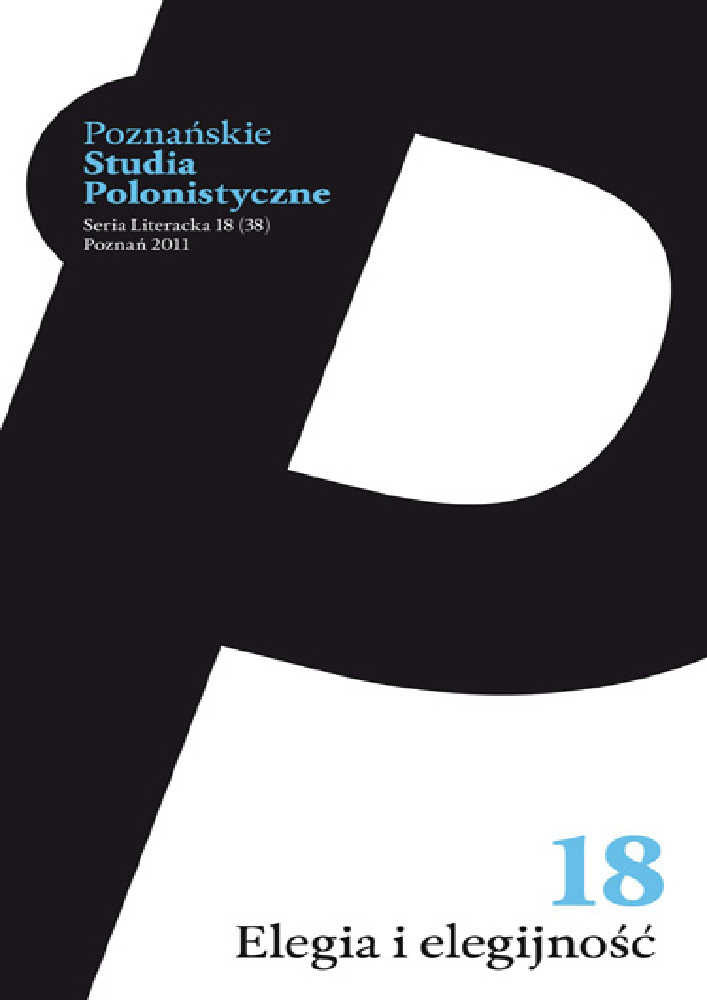Abstrakt
This article explores the relationships and correlations between early Greek elegy (7th—5th c. BC) and the elegiac mood of a poem understood today as a nostalgic and melancholic attitude of the subject evoked in a poem. The known surviving ancient texts prove the thematic heterogeneity of the elegiac genre at its early stage of development, while this elegiac emotionality is by no means a distinctive feature of this particular poetical category within the archaic parental context even though it does occur in some works composed in distichs that are traditionally labeled as elegiac (e.g. works of Archilochus and Mimnermus). Elegiac attitude, within modern understanding of the term, is also to be fund
in the melic poetry of early Greek poets (such as Sappho, Anacreon and Simonides of Ceos) which were, in fact, considered by ancient theoreticians as non elegiac as far as their genre was concerned. The attribution of the elegiac character, not linked genetically with any of genres, to one poetical category is thus a result of multilayered processes of cultural interaction and the reception of the early Greek literature rather than the substance of the genre.
Bibliografia
Atenajos. Uczta mędrców, przełożyli, wstępem i komentarzem opatrzyli K. Bartol, J. Danielewicz, Poznań 2010.
Bartol K., Elegia okresu archaicznego, w: Literatura Grecji starożytnej, red. H. Podbielski, t. 1, Lublin 2005, s. 325–327.
Bartol K., Greek Elegy and Iambus. Studies in Ancient Literary Sources, Poznań 1993.
Bartol K., Liryka grecka. Wybór tekstów i komentarz, red. J. Danielewicz, t. 1: Jamb i elegia, oprac. K. Bartol, Warszawa–Poznań 1999, s. 71–76.
Danielewicz J., Nowo odczytane teksty Safony i Archilocha, „Meander” 2005, nr 60, s. 135–142.
Feichtinger B., Elegy, w: The New Pauly, t. 2: Classical Tradition, Leiden 2007, szp. 154–159.
Gerber D.E., A Companion to the Greek Lyric Poets, Leiden 1997.
Iambi et elegi Graeci ante Alexandrum cantati, red. M.L. West, t. 1: Archilochus, Hipponax, Theognidea, Oxford 1971.
Iambi et elegi Graeci ante Alexandrum cantati, red. M.L. West, t. 2: Callinus, Mimnermus, Semonides, Tyrtaeus, minora, adespota, Oxford 1972.
Legeżyńska A., Gest pożegnania. Szkice o poetyckiej świadomości elegijno-ironicznej, Poznań 1999.
Liryka starożytnej Grecji, oprac. J. Danielewicz, Warszawa–Poznań 1996.
Page D.L., The Elegiacs and Euripides’ Andromache, w: Greek Poetry and Life, Oxford 1936, s. 206–230.
Poetae melici Graeci, red. D.L. Page, Oxford 1961.
Rusello N., Archiloco. Frammenti, Milano 1993.
Schmidt M., Didymi Chalcenteri grammatici Alexandrini fragmenta quae supersunt omnia, Leipzig 1854.
Szatyńska-Siemion A., Elegia i epigram. Kilka problemów terminologicznych, w: Elegia poprzez wieki, red. I. Lewandowski, Poznań 1995, s. 11–18.
Verdenius W.J., The Principles of Greek Literary Criticism, „Mnemosyne” 1983, nr 36, s. 49–51.
Licencja
Autorzy
Autorzy tekstów przyjętych do publikacji w czasopiśmie „Poznańskie Studia Polonistyczne. Seria Literacka” są zobowiązani do wypełnienia, podpisania i odesłania na adres redakcji umowy o udzielenie nieodpłatnej licencji do utworów, z zobowiązaniem do udzielania sublicencji CC.
Zgodnie z umową, autorzy tekstów opublikowanych w czasopiśmie „Poznańskie Studia Polonistyczne. Seria Literacka” udzielają Uniwersytetowi im. Adama Mickiewicza w Poznaniu niewyłącznej i nieodpłatnej licencji oraz zezwalają na użycie sublicencji Creative Commons Attribution-NoDerivatives 4.0 International (CC BY-ND 4.0).
Autorzy zachowują prawa do dalszego, swobodnego rozporządzania utworem.
Użytkownicy
Zainteresowani użytkownicy internetu uprawnieni są do korzystania z utworów opublikowanych od 2016 roku w „Poznańskich Studiach Polonistycznych. Serii Literackiej” pod następującymi warunkami:
- uznanie autorstwa – obowiązek podania wraz z rozpowszechnionym utworem, informacji, o autorstwie, tytule, źródle (odnośniki do oryginalnego utworu, DOI) oraz samej licencji;
- bez tworzenia utworów zależnych – utwór musi być zachowany w oryginalnej postaci, nie można bez zgody twórcy rozpowszechniać np. tłumaczeń, opracowań.
Do wszystkich tekstów opublikowanych przed 2016 r. prawa autorskie są zastrzeżone.
Inne
Uniwersytet im. Adama Mickiewicza w Poznaniu zachowuje prawo do czasopisma jako całości (układ, forma graficzna, tytuł, projekt okładki, logo itp.).
